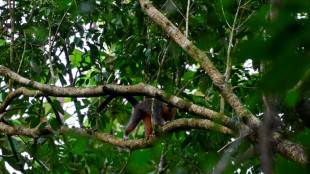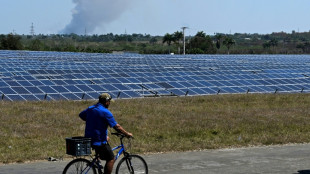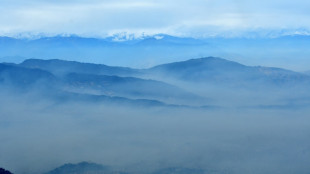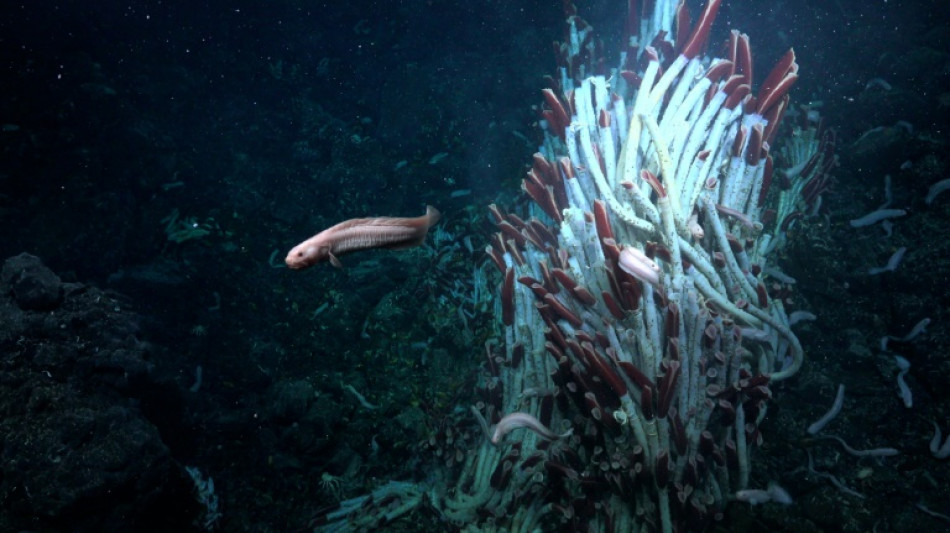
-
 Thomas, Bednarek hit jackpot at Grand Slam Track meet
Thomas, Bednarek hit jackpot at Grand Slam Track meet
-
Rodman on target as USA beat Brazil in Olympic rematch

-
 'Hands Off!' Anti-Trump Americans flood Washington
'Hands Off!' Anti-Trump Americans flood Washington
-
Harman leads by three at Texas Open

-
 Barcelona draw to increase Liga lead after Real Madrid stumble
Barcelona draw to increase Liga lead after Real Madrid stumble
-
Ecuador mounts anti-drug op overseen by Blackwater founder

-
 Pegula rallies to reach Charleston final
Pegula rallies to reach Charleston final
-
Nick Rockett flies to victory in magical Mullins Grand National

-
 Ovechkin on the brink of the 'impossible'
Ovechkin on the brink of the 'impossible'
-
Anthony, Bird to enter basketball Hall of Fame

-
 'Phenomenal' Munster edge O'Gara's La Rochelle to reach Champions Cup quarters
'Phenomenal' Munster edge O'Gara's La Rochelle to reach Champions Cup quarters
-
Munster edge O'Gara's La Rochelle to reach Champions Cup quarters

-
 Rahul, Jaiswal fire as Delhi and Rajasthan register big IPL wins
Rahul, Jaiswal fire as Delhi and Rajasthan register big IPL wins
-
Aston Villa beat Forest for seventh straight win ahead of PSG trip

-
 Jaiswal, Archer help Rajasthan thrash Punjab in IPL
Jaiswal, Archer help Rajasthan thrash Punjab in IPL
-
Inter's title charge stalls after throwing away points at Parma

-
 Real Madrid stumble at home to Valencia in Liga
Real Madrid stumble at home to Valencia in Liga
-
Leading garment producer Bangladesh holds crisis talks on US tariffs

-
 PSG win 13th French title ahead of Aston Villa Champions League clash
PSG win 13th French title ahead of Aston Villa Champions League clash
-
Nick Rockett storms to victory in the 'Mullins' Grand National

-
 Despair and sadness follow death of Malian musical great Amadou
Despair and sadness follow death of Malian musical great Amadou
-
Arsenal held by Everton, Wolves push Ipswich closer to relegation

-
 Lions contender Prendergast fires Leinster to Champions Cup quarters
Lions contender Prendergast fires Leinster to Champions Cup quarters
-
Nick Rockett wins the 'Mullins' Grand National for father and son
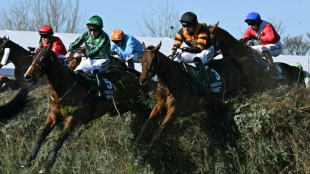
-
 Last-gasp Buendia goal keeps Leverkusen's Bundesliga title hopes alive
Last-gasp Buendia goal keeps Leverkusen's Bundesliga title hopes alive
-
Video shows last minutes before Gaza aid workers' deaths, Red Crescent says

-
 Zverev 'mentally' affected by Australian Open defeat
Zverev 'mentally' affected by Australian Open defeat
-
Rahul guides Delhi to third straight IPL victory

-
 Arsenal draw at Everton to edge Liverpool closer to Premier League title
Arsenal draw at Everton to edge Liverpool closer to Premier League title
-
Senate Republicans move forward with Trump tax cuts

-
 Sinner regrets 'unfair' doping ban as he prepares return to courts
Sinner regrets 'unfair' doping ban as he prepares return to courts
-
Isa hat-trick powers Toulon into Champions Cup quarters in Saracens thriller

-
 'Hang tough, it won't be easy': Trump defiant on tariffs
'Hang tough, it won't be easy': Trump defiant on tariffs
-
Zelensky slams 'weak' US reply to Russian strike on his hometown

-
 Musiala hamstring tear compounds Bayern's injury crisis
Musiala hamstring tear compounds Bayern's injury crisis
-
Selfies, goals and cheers at South Africa's grannies World Cup

-
 Tsunoda frustrated with 15th in Red Bull qualifying debut
Tsunoda frustrated with 15th in Red Bull qualifying debut
-
Rain forecast adds new element to combustible Japanese GP
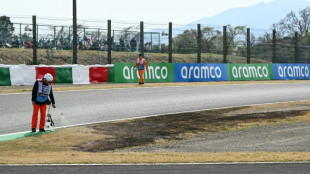
-
 Ukraine mourns 18 killed in Russian missile strike
Ukraine mourns 18 killed in Russian missile strike
-
Germany's Mueller to leave Bayern Munich after 25 years

-
 India's Modi clinches defence, energy deals in Sri Lanka
India's Modi clinches defence, energy deals in Sri Lanka
-
Verstappen snatches 'special' pole for Japan GP with lap record

-
 Cambodia hails opening of naval base renovated by China
Cambodia hails opening of naval base renovated by China
-
Verstappen snatches 'insane' pole for Japan GP in track record

-
 Thousands rally for South Korea's impeached ex-president Yoon
Thousands rally for South Korea's impeached ex-president Yoon
-
New Zealand hammer Pakistan by 43 runs to sweep ODI series 3-0

-
 Myanmar quake death toll passes 3,300: state media
Myanmar quake death toll passes 3,300: state media
-
India's Modi in Sri Lanka for defence and energy deals

-
 'No one to return to': Afghans fear Pakistan deportation
'No one to return to': Afghans fear Pakistan deportation
-
Fractious Republicans seek unity over Trump tax cuts

| RBGPF | 100% | 69.02 | $ | |
| RELX | -6.81% | 48.16 | $ | |
| NGG | -5.25% | 65.93 | $ | |
| BCE | 0.22% | 22.71 | $ | |
| JRI | -7.19% | 11.96 | $ | |
| BCC | 0.85% | 95.44 | $ | |
| SCS | -0.56% | 10.68 | $ | |
| CMSD | 0.7% | 22.83 | $ | |
| RYCEF | -18.79% | 8.25 | $ | |
| CMSC | 0.13% | 22.29 | $ | |
| GSK | -6.79% | 36.53 | $ | |
| AZN | -7.98% | 68.46 | $ | |
| RIO | -6.88% | 54.67 | $ | |
| BTI | -5.17% | 39.86 | $ | |
| VOD | -10.24% | 8.5 | $ | |
| BP | -10.43% | 28.38 | $ |

Worms and snails handle the pressure 2,500m below the Pacific surface
Giant worms found wriggling under the Pacific seabed have unveiled a thriving ecosystem in a fiercely hostile environment, according to a study published by Nature.
The team found the booming community 2,515 metres (8,250 feet) below the surface just off the coast of central America.
An underwater oasis has been created under a chain of mountains that run from north-to-south in the Pacific. In this part of the chain, two tectonic plates are moving away from each other, opening up hydrothermal vents that let out water heated by magma and loaded with chemical compounds.
The seabed zone was first discovered in the 1970s. But the latest research found tube worms and molluscs that thrive despite water pressure 250 times greater than at the surface and the total darkness.
The inhabitants of the animal Atlantis live off the nutrients produced by bacteria on the seabed.
Scientists are now trying to understand how the tube worm larvae get around so quickly to colonise new areas around the vents created after each underwater eruption.
- Underwater zoo -
One theory is that the larvae get under the crust with cold deep-sea water where it mixes with the hotter water created by earthquakes and eruptions and "and then they get spilled out at the surface and settle", said Monika Bright, a marine biology professor at the University of Vienna and co-author of the Nature study.
The scientists used a remote-controlled submarine, with its own digger for lifting rocks, to collect samples and sea floor images.
"While trying to collect the rocks we discovered that there are cavities below," Bright told AFP.
The cavities hid an underwater zoo of adult worms, limpets in shells, polychaetes, or bristle worms, and marine snails.
Bright said the team's work showed that "unexpected discoveries" can be made even at places that have been studied for more than 30 years, "probably just because nobody was thinking to look into the crust for animals before."
The cavities are about 10 centimetres (four inches) deep and worms up to 41cm long were found.
Bright said the conditions were similar to those at the surface where tube worms live. "The temperatures we measured were up to 25 degrees Celsius, oxygen was present and also toxic hydrogen sulphide in moderate concentrations."
The study said "larvae can disperse in cavities to potentially colonize lava cracks and the seafloor, or even settle and grow to adults and thereby proliferate" in the shallow vents.
Bright said the researchers believe the animals might not go down very far because the temperature rises, there is less oxygen and higher concentrations of hydrogen sulphide the deeper they go.
"It is important to know who lives there and to be able to protect them from deep-sea mining," said Bright. "This fauna is unique and should be protected."
P.Costa--AMWN
